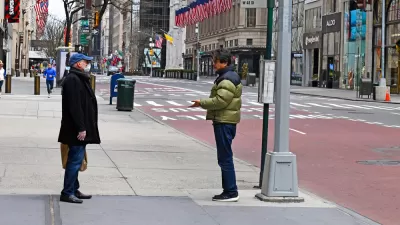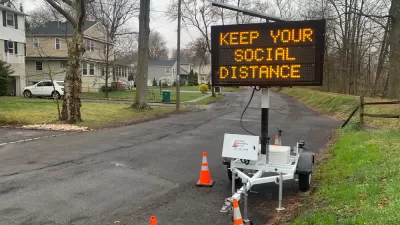This post from Wired's Autopia blog looks at the history and potential of an Intelligent Transportation System (ITS).
Smart communication tools and RFID chips have the potential to dramatically reshape the way people interact with city transportation systems.
"This future of transportation will be based around smart phones, mobile navigation systems and other common gadgets and will drastically change how we navigate and interact with cities.
The idea of ITS, at its most basic, is to connect every vehicle in a network of transportation users that instantly tracks and shares information. Ideally, everyone will be able to quickly determine where the accidents and tie-ups are and what routes can be taken to avoid them. What this means for the average commuter is quicker drive times by the way of more efficient traffic patterns and planned out routes created for you in real time.
Of course, transportation planners have been promising us this for the better part of two decades."
FULL STORY: Glimpse the Wireless Future of Transportation

Planetizen Federal Action Tracker
A weekly monitor of how Trump’s orders and actions are impacting planners and planning in America.

Maui's Vacation Rental Debate Turns Ugly
Verbal attacks, misinformation campaigns and fistfights plague a high-stakes debate to convert thousands of vacation rentals into long-term housing.

San Francisco Suspends Traffic Calming Amidst Record Deaths
Citing “a challenging fiscal landscape,” the city will cease the program on the heels of 42 traffic deaths, including 24 pedestrians.

Amtrak Rolls Out New Orleans to Alabama “Mardi Gras” Train
The new service will operate morning and evening departures between Mobile and New Orleans.

The Subversive Car-Free Guide to Trump's Great American Road Trip
Car-free ways to access Chicagoland’s best tourist attractions.

San Antonio and Austin are Fusing Into one Massive Megaregion
The region spanning the two central Texas cities is growing fast, posing challenges for local infrastructure and water supplies.
Urban Design for Planners 1: Software Tools
This six-course series explores essential urban design concepts using open source software and equips planners with the tools they need to participate fully in the urban design process.
Planning for Universal Design
Learn the tools for implementing Universal Design in planning regulations.
Heyer Gruel & Associates PA
JM Goldson LLC
Custer County Colorado
City of Camden Redevelopment Agency
City of Astoria
Transportation Research & Education Center (TREC) at Portland State University
Jefferson Parish Government
Camden Redevelopment Agency
City of Claremont





























